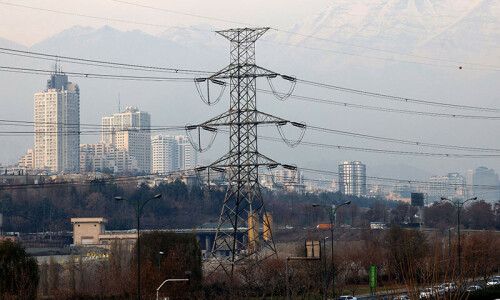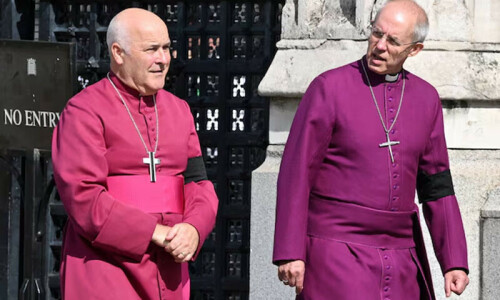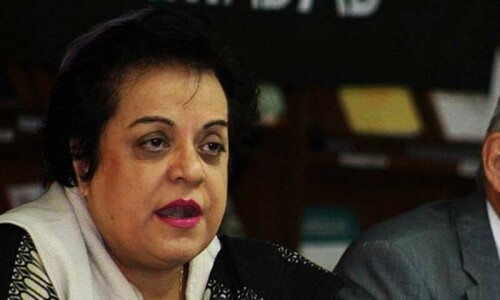UNTIL a couple of weeks ago, the third largest nation in Africa was supposed to be heading towards a transition to some form of civilian rule. The unexpected but welcome overthrow of Gen Omar al-Bashir four years ago had raised hopes of a meaningful transformation to a significant break from Sudan’s broad trajectory since its independence in 1956.
Rivalry between a couple of generals has not only thwarted that prospect but embroiled Khartoum in the kind of fighting it has not witnessed since colonial conflict more than a century ago. The baseline dispute is evidently over how long it should take for the Rapid Support Forces (RSF) — a direct descendant of the Janjaweed militia that wreaked havoc in Darfur in the early 2000s — to be incorporated into the regular armed forces.
The main beneficiary of the 2021 coup that replaced a hybrid regime with a junta, army chief Gen Abdel Fattah al-Burhan, wanted the process to take two years. His current rival, Gen Mohamed Hamdan Dagalo, aka Hemedti, would prefer to extend the process for a decade. Disdained by the Khartoum elite, he obviously doesn’t wish to be stripped of his power base in short order.
The consequence, instead of a UN and US-supervised agreement to establish a less ambiguous form of civilian rule than the unsuccessful hybrid set-up that followed Bashir’s ouster in 2019, has been open warfare on the streets of Khartoum. Most Western and many other diplomats have fled the capital, with the US deploying special forces including the SEAL Team 6 that sealed Osama bin Laden’s fate on the outskirts of Abbottabad.
Events in Sudan reinforce the military’s political incompetence.
Bin Laden was based in Khartoum for five years from 1991, returning to Afghanistan after Sudan was pressured to expel him, but neither Riyadh nor Washington was willing to take custody of the Saudi, notwithstanding his strongly suspected association with Islamist militancy.
That’s by the by, although it’s useful to remember that the leading forces in Sudan have dabbled in socialism and even communism as well as political Islam. For instance, Jaafar Nimeiri, who led a military coup in 1969 posed as a socialist who switched his allegiance from the USSR to China in the aftermath of a purportedly communist coup attempt against him in 1971, but later dabbled in Islamism, imposing Sharia two years before his ouster in 1985.
The post-Cold War scramble for Africa is different from the 19th-century variety to the extent that direct colonisation is not intended, and that this variety of the ‘Great Game’ has extended beyond European powers. Egypt, Libya, Saudi Arabia and the UAE are now part of the mix, and Russia — which had no obvious interests in the continent in tsarist times — is an occasionally forceful participant. The US and UN have been courting both of the key generals who cooperated in 2019 and 2021 but are now at loggerheads, possibly locked in a fight to the finish at the expense of the civilian population — and the interests of Sudan as a nation.
Burhan and Egypt’s Abdel Fattah al-Sisi were contemporaries in military school, and Cairo backs the Sudanese military. The Saudis are inclined in the same direction, but hedging their bets. So are the Russians, even though the infamous Wagner Group — modelled on the American mercenary group Blackwater — has collaborated with the RSF in the recent past, as it has with the Libyan general Khalifa Haftar, deemed an ally of Hemedti.
The latter reportedly contributed 1,000 troops to support Haftar’s Libyan National Army, and up to 40,000 to back the Saudi-Emirati aggression in Yemen.
Sudanese who have borne the brunt of the clashes in Khartoum and elsewhere are keen to be rid of both the warring factions, whose vested interests — including the Bashir-era elite that the military under Burhan has sought to sustain — do not by any stretch coincide with popular aspirations. There’s no easy way out, though, and the region’s colonial legacy cannot be entirely separated from its fraught post-colonial experience.
Who knows what will come next, but a transition to a civilian-led democracy seems to be a distant dream at the moment, even if the unarmed masses were to rise up once again against heavily armed military factions ultimately interested only in securing their own fortunes.
As Pakistanis know only too well, that’s not an unusual trajectory for men in uniform and the captured institutions that sing from the same song sheet. Is it too much to hope, though, that the fate of Sudan could serve as a cautionary tale for other post-colonial nations that have relied too heavily on their military forces to establish a sustainable polity, ignoring the extended experience of their frequently demonstrated incompetence as nation-builders?
Published in Dawn, April 26th, 2023













































Dear visitor, the comments section is undergoing an overhaul and will return soon.